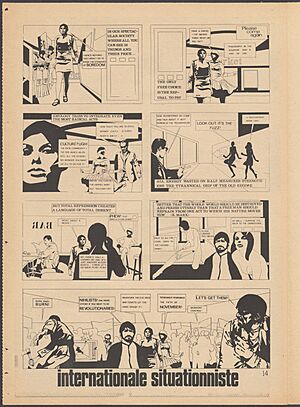Raoul Vaneigem facts for kids
Quick facts for kids
Raoul Vaneigem
|
|
|---|---|
| Born | 21 March 1934 |
| Nationality | Belgian |
| Education | Free University of Brussels (1952–1956) |
|
Notable work
|
The Revolution of Everyday Life |
| Movement | The Situationist International |
Raoul Vaneigem (born March 21, 1934) is a Belgian writer. He is best known for his important 1967 book, The Revolution of Everyday Life.
Contents
About Raoul Vaneigem
Early Life and Education
Raoul Vaneigem was born in Lessines, a town in Hainaut, Belgium. He went to the Free University of Brussels from 1952 to 1956. There, he studied philology, which is the study of language and literature.
Joining the Situationist International
From 1961 to 1970, Vaneigem was a member of a group called the Situationist International. This was a group of thinkers and artists who wanted to change society. They believed that modern life had become too focused on things like shopping and watching TV, and that people were losing their freedom.
Vaneigem and another member, Guy Debord, were two of the main thinkers of this group. They wrote many ideas about how society could be different.
His Most Famous Book
Vaneigem's most famous book is The Revolution of Everyday Life. It was published in 1967. Many of his ideas and slogans from this book became popular during the big protests in Paris in May 1968.
In his book, Vaneigem talked about "passive nihilism." This is like quietly accepting things that don't make sense in modern life. He thought this way of thinking made people just go along with what everyone else does, which he called "conformism." He wanted people to challenge this and live more freely.
Vaneigem's Writing Style
Raoul Vaneigem had a very strong voice within the Situationist International. His writing was often more poetic and full of spirit compared to Guy Debord's more political style. The Revolution of Everyday Life helped to show different sides of the group's ideas.
Vaneigem was one of the longest-serving members of the Situationist International. He also helped edit their journal, Internationale Situationniste. He eventually left the group in November 1970.
After the Situationist International
After leaving the Situationist International, Vaneigem continued to write many books. These books often argued for the idea of a free and self-governing social order. He believed that society could organize itself without too many rules from above.
He sometimes used different names, called pseudonyms, for his writings. Some of these names included "Ratgeb" and "Michel Thorgal." He also wrote about the importance of freedom of speech, believing that people should be able to express their thoughts openly.
See also
 In Spanish: Raoul Vaneigem para niños
In Spanish: Raoul Vaneigem para niños


